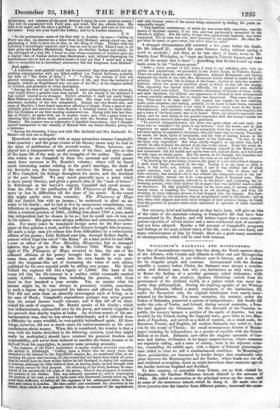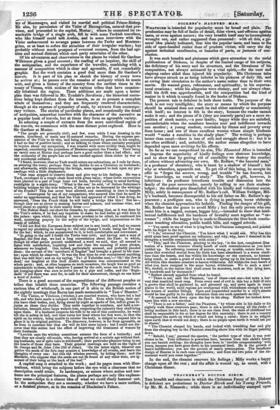WILKINSON'S DA.LMATIA AND MONTENEGRO.
THE line of mountainous country that lies along the North-eastern shore of the Adriatic, with Croatia and Albania at either end and Herzegovina or rather Bosnia behind, is not without note in history, and is curious for its singular people and customs. Incorporated with the Roman republic a century before Christ, the Dalmatre were always a trouble- some and distinct race, but who yet, barbarians as they were, gave to Rome the fashion of a peculiar garment, called dalmatica ; while to the capital of the country, Spalato, Diocletian retired from the government of the civilized world, in a palace which was more im- perial than philosophical. During the expiring agonies of the Western Empire, Dalmatia offered a manly resistance to the barbarians, till, under the Byzantine rule, the original inhabitants were nearly exter- minated by the Selaves. For many centuries, the country, under the Dukes of Dalmatia, preserved a species of independence; but finally fell under the yoke of Venice, and formed, during several centuries, a fron- tier land against the Ottomans. On the downfall of the Venetian re- public, the country became a portion of the spoils of Austria; but was invaded by the French during the Imperial wars, gave titles to two Mar- shals of Napoleon, and served as a field of contest, on a small scale, for Russians, French, and English, till modern Dalmatia was ceded to Ans• tria by the treaty of Vienna ; the small mountainous district of Monte- negro retaining its independence as a species of republic with the Prince- Bishop at its head. Dalmatia now offers the singular spectacle of Ger- man and Italian civilization in its larger seaport-towns, where steamers are regularly calling, and a state of society, even in the adjacent coun- try, resembling the middle ages, with a degree of Oriental picturesque- ness added to what we call a semibarbarous condition. In Montenegro these peculiarities are increased by border forays that continually take place between the Montenegrins and the Turks ; where heads are cut off, and exhibited as trophies, much as might have been done centuries ago on the border between England and Scotland.
To this country, so accessible from Trieste, yet so little visited by Englishmen, Sir Gardner Wilkinson betook himself in the autumn of 1844. He called in succession at the principal towns on the coast, and at some of the numerous islands which lie along it. He made two or three journies into the interior from different points; traversed the corm-
try of Montenegro, and visited its martial and political Prince-Bishop. He also, by permission of the Vizier of Herzegovina, entered that pro- vince, and proceeded to the capital, Mostar ; where he examined its re- markable bridge of a single arch, fell in with some Turkish travellers, who like himself could talk Arabic, and in some interviews with the Vizier endeavoured to arrange peace between the Turks and Montene- grins, or at least to soften the atrocities of their irregular warfare ; but probably without much prospect of eventual success, from the bad opi- nion and mutual distrust which each party entertains of the other.
Of his adventures and observations in the places he visited Sir Gardner Wilkinson gives a good account ; the reading of an inquirer, the skill of the antiquarian, and the experience of the traveller, combining with a manner of composition which is clear and agreeable, if not remarkably graphic. But the work contains a good deal more than Sir Gardner's travels. It is part of his plan to sketch the history of every town he arrives at ; he pauses over the remains of antiquity which he meets with, and gives a history of the country from the earliest times to the treaty of Vienna, with notices of the various tribes that have occasion- ally inhabited the region. These additions are made upon a better plan than was followed in Mr. Tyndale's Sardinia ; the historical narra- tives being kept distinct from the travels, so as to present a complete whole of themselves ; and they are frequently rendered characteristic, though at the expense of symmetry of scale, by extracts from contempo- rary writers. The stories of particular places, and occasionally the detail of antiquities, somewhat interfere with the character of the narrative as a popular book of travels, but at times they form an agreeable variety. In selecting a couple of extracts from the more uncivilized region of the travels, we commence with the most distant point explored. Here is Sir Gardner at Mostar.
"The people are generally civil; and few, even while I was drawing in the streets, interfered, or made any ill-natured remarks. Having the express per- mission of the Vizir to do this, and being accompanied by persons in his employ, I had no fear of positive insult; and on talking to those whom curiosity prompted to inquire about my occupation, I was treated with more civility than might be expected, considering the prejudices of Moslems against the Franks. Their being SO rarely seen at Mostar may perhaps have a good rather than a bad effect; and the animosity of the people has not been excited against them either by war or any accidental collision. "I found, however, that no Turk would return my salutations, as I rode by them, on entering the town; perhaps from the dislike to see a Christian on horseback; and afterwards, while measuring the bridge, some appeared to look upon my pro- ceedings with a little displeasure. "One man stopped to observe them and give way to his feelings. He was a Turk, enveloped in a rough cloak lined with green baize; whose lower extremities were planted in a pair of huge loose red boots, forcibly calling to mind farthing
rushlights in a night-lamp. What is the use,' lie said,' of Sultan Suleyrnan s building bridges for the true believers, if they are to be destroyed by the writings of the Franks? This has never been allowed, and something is sure to happen —' Interrupted by one of my companions, who assured him that he need be under no apprehensions, and that the Vizir had approved of what I was doing, he answered, Does the Frank think he will build a bridge like this? Not he— though they are so clever in making knives and scissors, and unclean wine, and move about so quickly in their scanty dress —'
"The Hakim-Bashi cut short his remarks, by observing that, as it was done by the Vizir's orders, if he had any inquiries to make he had better go with him to the palace: upon which, thinking it more prudent to be silent, he continued his walk, muttering prayers for the safety of the bridge, and imprecations on the heads of infidels.
"I did not find the European dress subject me to any insult, and had no reason to regret my persisting in wearing it: the only change I made being the Fez cap for the hat; which, to one accustomed to it, is both comfortable and convenient.
"In going to the cafe I found the Turks very civil; and having met a man of Bagdad, the first day, we had a long conversation about the East: to which, though nO other person present understood a word we said, they all seemed to listen with satisfaction, inquiring now and then the meaning of some phrase, whenever we laughed. One, indeed, particularly amused, and probably puzzled them: the servant of the 'merchant of Bagdad' had brought a parcel to his mas- ter; upon which he observed, 'It was the first time he ever remembered anything that was told him'; and on my saying, Yal el Yahoodee mat,'—' Oh! the Jew is dead,' our laughter at this droll Arabic expression was communicated to the whole party; and, as often happens on such occasions, the laugh was so good an introduction to them, that whenever I passed by the cafe, some one in that Turk- ish lounging-place was sure to invite me to a pipe and coffee, and the Bogh- dadli ' if not there was sent for, to talk for their amusement, though no one knew a word of Arabic."
There is a good account of the superstitions of the different peoples or tribes that inhabit these countries. The following passage contains a curious idea of witchcraft, in one part of it akin to the British notion of the nightly meetings that Burns has made memorable in " Tam o' Shanter." " The Vistize, or Viestizze, (witches,) are married women, who have led a bad life, and who have made a compact with the Devil. Even while living, their spi- rits leave their bodies, and, flying about by night as sparks of fire, inflict great in. juries on those they dislike. They unite together in numbers, and hold a con- sultation, beneath some large walnut-tree, respecting the calamity they shall bring upon them. If a husband suspects his wife to be one of this community, he waits till she is asleep in bed, and then turns her head where her feet were; so that the spirit on its return, being unable to reenter the body, is obliged to request him to place it in its original position. The discovery, however, is far from agreeable, as he lives in constant fear that she will do him some injury: but I could not dis- cover that this notion had the effect of improving the treatment of women by their husbands.
"Lovrich says the witches sometimes assume the form of a butterfly; and that they are mostly old maids, who, having arrived at a certain age without find- ing husbands, out of spite take to witchcraft; their particular pleasure being to eat the hearts of those they hate. Their general meetings are held on the vigils of St. George and St. John (the 23d of June). On the latter night, whoever can gather the seeds of the fern may acquire a knowledge of all events, and learn the thoughts of every one: but this the witches prevent, by hiding them; and the Morlachi, who suppose that the seeds are not be found at any other time, are ig- norant of their being at the back of the leaf.'"
A capital map is attached to the work ; and its pages teem with illus- trations, which bring the subjects before the eye with a clearness that no description could attain. In landscapes, or scenes where action and cos- tume are the principal features, the plates perhaps are only like explana- tory notes—helps to a clearer idea of what we could dimly hammer out. In the antiquities they are a necessity, whether we have a mere outline, or a finished picture, as in the remains of Diocletian's Palace.



























 Previous page
Previous page